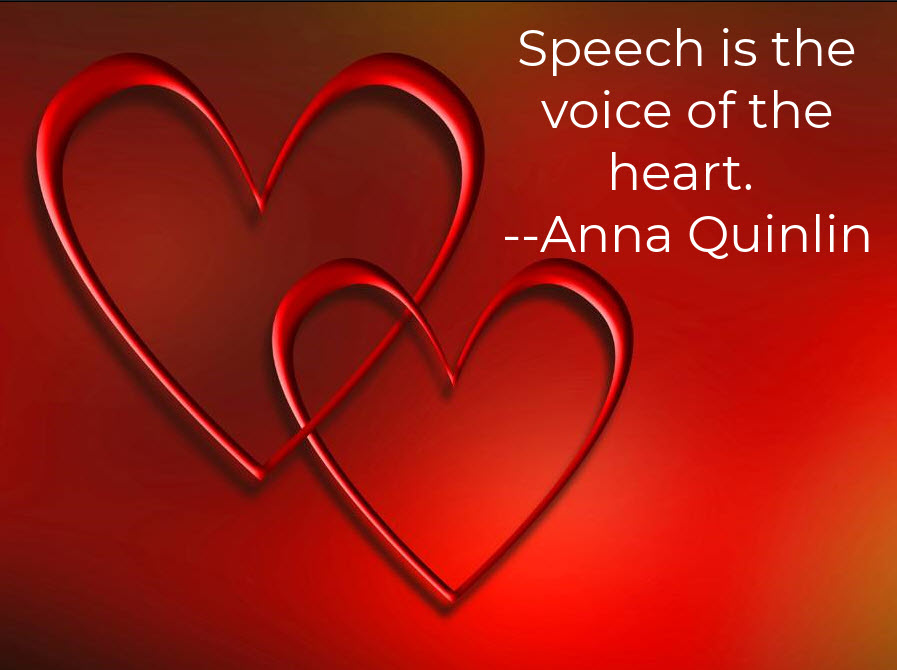How to Create a Loving Voice
What’s a loving voice? We all know what an irritated, impatient voice sounds like. No, that’s not love at all. When we hear this tone, the voice is very animated, the rate is fast and the rhythm is short and staccato; perhaps the volume has increased, too. (Think Lisa Simpson.) It’s so identifiable, isn’t it? And it’s not a good feeling to be on the receiving end of it.

If irritation and impatience are easy to spot in someone’s voice based on a few characteristics of speech, language and voice, what characteristics are present when you hear a friendly, warm and loving voice? Is it just the opposite of the impatient voice? Well, let’s take a look…..The voice and the heart are very much connected. When we feel loving, it will show not only in action but in the words and tone of voice we use.
Think of someone you know who has a loving sound. Maybe your partner, a friend, a colleague or a parent? How can you tell that person is demonstrating love just through their voice? For example, your partner, friend or colleague calls you on the phone to chat. You can’t see that person so the visual cue has been removed, but you know who they are and you immediately know their mood—and on this call, you are feeling the love. How do you know that? Pay attention to their voice. What do you hear?
Is it soft and gentle?
Is there a lot of pitch variation?
Is the rate of speech fast or slow?
Enthusiastic? (And how do you know that?)
Decoding the “sound” of another person is a difficult task. Sometimes it’s so easy to tell and other times it is based on intuition. You might hear someone say, “I don’t like the way that person just spoke to me.” Even though something was amiss in the sound or tone, it wasn’t apparent as to exactly why. Other people have a real knack for identifying exactly the characteristic that shaped the sound. You might hear someone say, “I didn’t like their tone. It was condescending.”
A few weeks ago, I received a phone call from a friend who was clearly upset about a work situation. She spoke very quickly and her voice was animated and high-pitched. She also used words that clearly made her sound anxious and a bit down. As we talked through her situation and as she became more relaxed and comfortable, her voice began to change. She went from tense and upset to relaxed and gentle. As she was able to process her predicament, her voice changed right along with her emotion. It was really great to hear and it reminded me that when our heart is in a place of anxiety, and emotions are running high, this is not the time to approach the person you are feeling anxious about. Rather, giving yourself time to cool off and process, you will have a greater chance of successfully communicating your complaint, your ideas and your proposed solutions in a way that is more loving and friendly. People (your audience) will respond more favorably, too.
So, what comprises a loving tone? It’s usually slower in rate, has a lot of vocal variety, is calm and relaxed and lower in pitch.
What can you do to be aware of your tone?
It’s really quite simple, but at the same time difficult to do. (It’s difficult to remember to be observant.) But when you do listen to your sound, what do you notice and what is your mood?
Just as the infamous saying of never go to bed angry, incorporate a short promise like, “Never respond with anger.” Then begin to watch for that slight irritation or emotion creeping up in you. What voice voice characteristics do you notice and what are your physical symptoms? Does your face turn red? Does your stomach churn? Whatever it is, your awareness of it is a sign to give yourself some time to calm down, relax and process before responding to or approaching your colleague about the situation that has upset you. Anger, irritation and impatience are natural emotions, but responding impulsively may lead you to sound in a way that you don’t really want. If you can have a goal of responding warmly and lovingly every time, you are likely to have more favorable outcomes. Your calm style will also expose warm feelings and consequently, improve your relationships.
Tags: heart and voice connection, loving voice, speech is the voice of the heart, talk slowly
